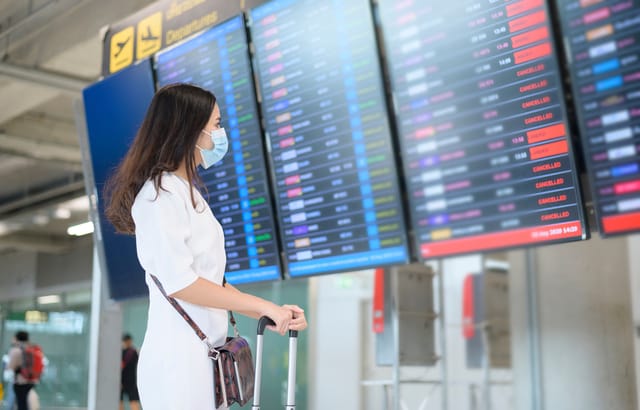We’re living in unprecedented times. Many people have seen their travel plans scuppered by the closing of international borders. In addition, the cancellation of flights and forced closure of hotels in government attempts to slow the spread of the COVID-19 virus. It can be a bit bewildering when a trip you’ve had planned for months is suddenly canceled. Nevertheless, there are processes in place to ensure you don’t lose out financially. In this article, we’ll discuss dealing with COVID-19 travel and advice you should take if your trip is canceled because of the Coronavirus.
Dealing with COVID-19 Travel
The country I am due to visit closes its borders or travel to the country is unadvised. What do I do?

First things first, check your government’s website for up-to-date travel advice regarding the state of travel to different countries. In the UK, the place to head is the Foreign, Commonwealth, & Development Office website, which can be found here. In other countries, you’ll need to check your national government site. If your government is recommending against all but essential travel to a country i.e. you should not travel there on holiday. Then your booking should be canceled by the operator of your holiday and you are entitled to a full refund.
However, this doesn’t apply to travel booked independently. For example, if you booked a holiday in Spain and travel is unadvised to the country, then you will get a refund. But if you booked your flights separately, this part of the refund is not guaranteed.
It is worth noting that many holiday operators have not been issuing cash refunds, but credit notes so that passengers can rebook their holidays. This is understandable. Many companies are at risk of going bankrupt during the COVID-19 crisis. Nonetheless, the simple fact is that consumer rights dictate if you want a cash refund then you are entitled to one. Speak to your travel company first, and if necessary, your bank. Alternatively, if you are happy for your travel company to hang on to your cash, you can rebook your trip for a later date.
What about airlines?

Getting a refund for individually booked flights can be a bit more tricky as mentioned above. The simple fact remains; You are due a refund if your flight is canceled. This applies to the EU, with rules being slightly different elsewhere. Your rights will depend on the individual airline you booked with, so check their terms. Many airlines have made it very difficult to claim a refund, despite the legal protections offered to consumers.
Phone lines are not being answered and people are reporting being sent a voucher instead of a cash refund, which airlines are then refusing to swap. Others are flatly refusing to issue refunds. This is a dereliction of duty from these airlines. Customers should once again try to claim a refund through their bank.
If your flight hasn’t been canceled, unfortunately, you are not owed a refund. So, for example, if you had a villa booked in Greece and the proprietor of the villa canceled your booking because of Coronavirus, they will owe you a refund. But if you had booked your flight to Greece separately and that flight was still going ahead as planned, the airline is not entitled to issue you a refund. Even if government advice says you shouldn’t travel to a country, airlines are not necessarily canceling their flights.
If you find yourself in this situation then the advice is to speak to the airline. Some will issue vouchers or waive rebooking fees for you to change your flights to a later date or next year. A refund in this instance isn’t likely, so this is your best option. If you decided to travel anyway then there is a chance you will invalidate your travel insurance. This is not advised.
My holiday hasn’t been canceled, but I’m worried about the virus and don’t want to go. What do I do?
This is perfectly understandable. Many people are nervous about traveling through airports and on airplanes at the moment. Even if their destination is relatively virus-free. If you cancel your trip yourself then you risk losing any money that you have already paid towards your trip. However, in an attempt to survive this terrible crisis, many travel operators have introduced flexible re-booking policies. For example, you may be able to re-book your trip at no extra cost up to 14 or 21 days before departure.
This means that if your holiday is coming up and you aren’t feeling comfortable about traveling, the best thing to do is phone your travel company and be honest. You probably still want to travel, but not right at this moment. Many companies will allow you to reschedule your trip for next year. This gives you something to look forward to travel-wise. It also allows them to keep some money in the bank to help them survive the winter. This is a “win-win” for consumers and operators. It’s worth noting that if these future bookings are canceled, you will still be entitled to a full refund.
Dealing with COVID-19 Travel Cancelations Recap
The first thing to do if you have a holiday booked that is canceled, or you simply don’t want to go anymore, is to speak to your travel operator. Many have brought in new policies dealing with the COVID-19 crisis. Most are more than willing to help you rebook or issue you with a refund. If you have trouble claiming this refund then the best thing to do is to contact your bank and see if they can help you to reclaim your funds.

